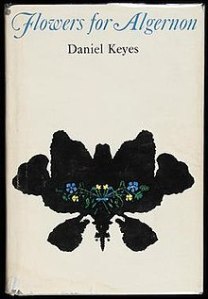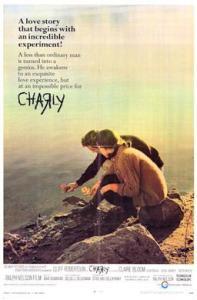‘Flowers for Algernon’ by Daniel Keyes
 “Flowers for Algernon is a short story by American author Daniel Keyes, later expanded by him into a novel and subsequently adapted for film and other media. The short story, written in 1958 and first published in the April 1959 issue of The Magazine of Fantasy & Science Fiction, won the Hugo Award for Best Short Story in 1960. The novel was published in 1966 and was joint winner of that year’s Nebula Award for Best Novel (with Babel-17).” – Wikipedia
“Flowers for Algernon is a short story by American author Daniel Keyes, later expanded by him into a novel and subsequently adapted for film and other media. The short story, written in 1958 and first published in the April 1959 issue of The Magazine of Fantasy & Science Fiction, won the Hugo Award for Best Short Story in 1960. The novel was published in 1966 and was joint winner of that year’s Nebula Award for Best Novel (with Babel-17).” – Wikipedia
The name of the Algernon character, a mouse, was inspired by the name of the English poet Algernon Charles Swinburne. The story focuses on the ethical considerations that come out of the treatment of the mentally disabled and is drawn from events from the author’s life.
 My generation studied this novel in school, but by now–with all the movies available online and via satellite TV–I suppose more people have seen the 1968 movie film “Charlie” for which Cliff Robertson won the Best Actor Oscar and for which Stirling Silliphant won the Best Screenplay Oscar.
My generation studied this novel in school, but by now–with all the movies available online and via satellite TV–I suppose more people have seen the 1968 movie film “Charlie” for which Cliff Robertson won the Best Actor Oscar and for which Stirling Silliphant won the Best Screenplay Oscar.
Wikipedia notes that “Roger Ebert gave the film three stars out of four, writing ‘The relationship between Charly (Cliff Robertson) and the girl (Claire Bloom) is handled delicately and well. She cares for him but inadequately understands the problems he’s facing. These become more serious when he passes normal IQ and moves into the genius category; his emotional development falls behind. It is this story, involving a personal crisis, which makes Charly a warm and rewarding film.'”
The American Library Association includes the novel on the list of those most frequently challenged between 1990 and 1999 because of portions that describe Charlie trying to cope with his sexual desires.
From the Publisher of the 2005 Edition
 With more than five million copies sold, Flowers for Algernon is the beloved, classic story of a mentally disabled man whose experimental quest for intelligence mirrors that of Algernon, an extraordinary lab mouse. In poignant diary entries, Charlie tells how a brain operation increases his IQ and changes his life. As the experimental procedure takes effect, Charlie’s intelligence expands until it surpasses that of the doctors who engineered his metamorphosis. The experiment seems to be a scientific breakthrough of paramount importance–until Algernon begins his sudden, unexpected deterioration. Will the same happen to Charlie?
With more than five million copies sold, Flowers for Algernon is the beloved, classic story of a mentally disabled man whose experimental quest for intelligence mirrors that of Algernon, an extraordinary lab mouse. In poignant diary entries, Charlie tells how a brain operation increases his IQ and changes his life. As the experimental procedure takes effect, Charlie’s intelligence expands until it surpasses that of the doctors who engineered his metamorphosis. The experiment seems to be a scientific breakthrough of paramount importance–until Algernon begins his sudden, unexpected deterioration. Will the same happen to Charlie?
“For lovers of Science Fiction, this story, in its original short story form was always a special kind of tour de force, a classic to be given to people you were trying to convert to the genre. Now, and regretfully, unfortunately, it has been turned into a full novel which in turn is being made into a motion picture. The idea is still unique. It’s still Charlie Gordon’s journal starting from “”progris riport 1 martch 3″”…””Dr. Strauss says I should rite down what I think and remembir and every thing that happens to me from now on.”” And it’s still the tormented story of a human being with a low intellect, who has a passion for learning and who is used as a guinea pig in an experiment designed to triple the I.Q. It is still the story of the adjustment of a man who swings from one end of the intelligence scale to the far other. But now, oh what Freudian psychoses riddle the pages of the Progress Reports. What shapely Hollywooden scenes come to view. What bastardization of what was once so beautifully put. The beginning and end seem relatively untouched and remain striking in their simplicity (the end is a real tear jerker). The middle section is saved only by the relatively few scenes with Algernon, the guinea pig mouse Charlie used to race with.”
I agree. The story began so well. And then things happened that seemed to dilute it because it lacked what it had as a short story: truth and a pure focus. I take issue with the fact that the experiment was even considered, much less done. And that, I think, is the real message of the book: do you do this or do you not do this?
–Malcolm



